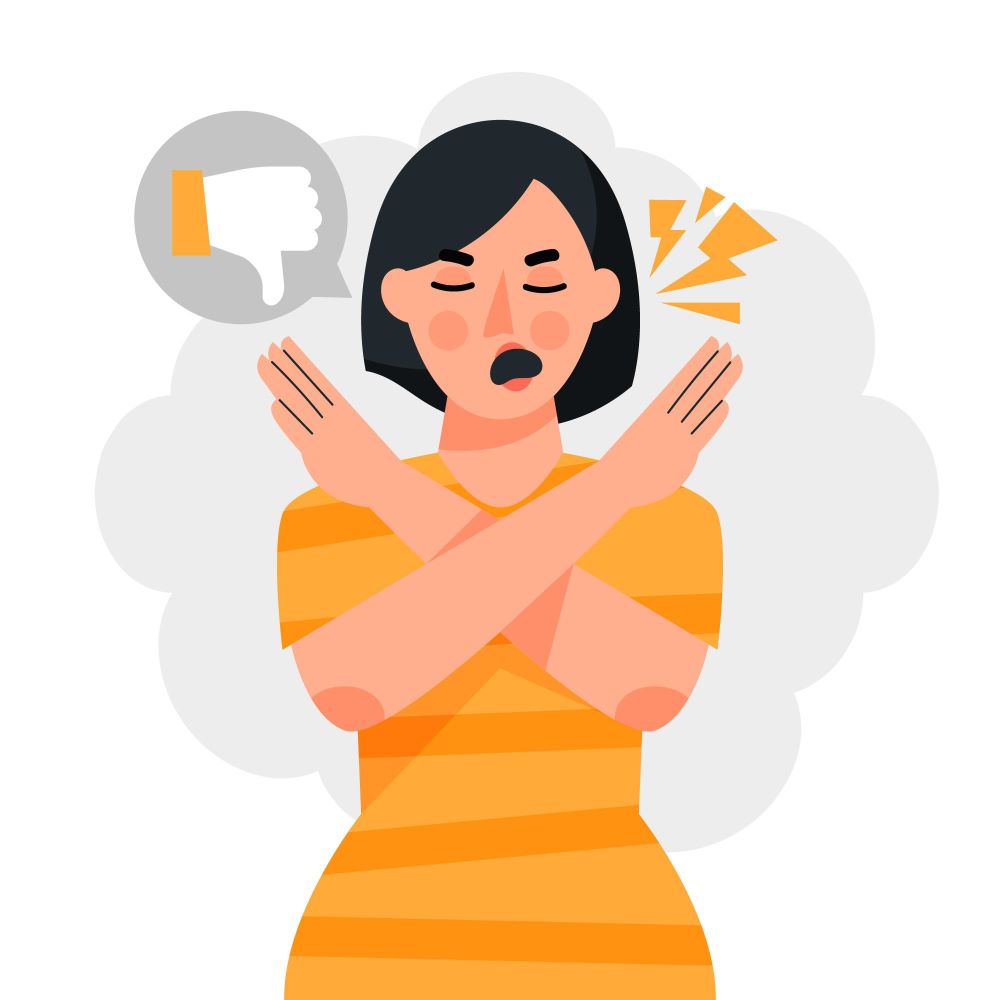
Negative sentence in French
Master the French negation! How to negative a sentence and especially how to use it? We will see the different types of negation in French.
After this easy way to learn, you will never have problem to do negative sentences in French.
How to create a negative sentence?
Basic principle: NE + VERB + PAS
NE goes before the verb and PAS after the verb.
Example :
J’aime le chocolat.=> Je n’aime pas le chocolat/ I like the chocolate. => I do not like chocolate.
Il aime les bonbons => Il n’aime pas les bonbons / He likes the candy => He does not like the candies
With negation, the indefinite articles UN / UNE / DES / DU / DE LA / DE L’ / DES transform into DE
Example :
J’ai une voiture. => Je n’ai pas de voiture. / I Have a car. I don’t have a car
Tu manges du chocolat => Tu ne manges pas de chocolat/ You eat chocolate. You don’t eat chocolate
With the verb to be: C’EST + UN / UNE / DU / DE LA / DE L’ / CE SONT + DES

Master negation in French
C’est une catastrophe => Ce n’est pas une catastrophe / It’s a catastrophe => This is not a catastrophe
Ce sont des études difficiles => Ce ne sont pas des études difficiles./ Those are difficult studies => These are not difficult studies.
In case of compound time for French negation:
The negation is placed around the auxiliary:
Example :
Elle ne m’a pas dit. / She didn’t tell me.
Je ne lui ai pas répondu./ I don’t answer him
With a verb in the infinitive, NE+PAS is placed before the verb:
Examples:
Je lui ai dit de ne pas fumer. / I told him not to smoke.
Il a décidé de ne rien manger. / He decided not to eat anything.
Ne pas marcher sur le gazon. / Don’t walk on the grass.
Les autres types de negation

Non, ne…pas….ne plus…ni….ni. The types of French negation.
Negation with reflective verbs like se lever, se raser, se promener
Put the “Ne” before the reflexive form “me” and “pas” after the verb.
Je ne me lève pas/ I do not get up
Il ne se rase pas / He doesn’t shave
Je ne me promène pas./ I don’t walk around.
Adverbs with negation
- « Aussi » (also) is transformed into negation by « non plus » (no …more).
Tu viens aussi.=> Tu ne vient pas non plus. / You also comes. You’re not coming either.
Elle aussi, elle vient =>Elle non plus, elle ne vient pas./ She, too, is coming. She’s not coming either
- « Quelques » (some) become « aucun» (none), in a negative sentence.
Il reste quelques morceaux => Il ne reste aucun morceau. / There are a few pieces left => There are no pieces left
- The adverb « beaucoup » (a lot) is transformed into negation by « ne….pas beaucoup (de, d’)» (not much).
Il y a beaucoup de bruit => Il n’y a pas beaucoup de bruit. / There’s a lot of noise => There’s not a lot of noise.
Tu travailles beaucoup => Tu ne travailles pas beaucoup. / You works a lot => You don’t work a lot
- « Déjà » (already) become « ne…pas encore » into negation.
Elle est déjà là ! => Elle n’est pas encore là ! / She’s already here! => She’s not here yet!
- « Encore » is transformed into negation by « NE … PLUS».
Il travaille encore => Il ne travaille plus./ He is still working => He is no longer working.
- « Quelque part / partout » become « NE … nulle part» into negation.
Il va quelque part ce week-end.=> ll ne va nulle part ce week-end. / He’s going somewhere this weekend => He’s not going anywhere this weekend.
Elle a cherché partout. => Elle n’a cherché nulle part./ She looked everywhere => She didn’t look anywhere.
- « Souvent/ toujours » is transformed into negation by « NE … jamais».
Je regarde souvent la télévision => Je ne regarde jamais la télévision.
Il parle toujours => Il ne parle jamais./ He often watches television => He never watches television.
Other types of negation

Je peux…je ne peux pas. A type of French negation.
- « Et » (and) is transformed into negation by « ni…ni » in the negative
Il aime la musique et le sport => Il n’aime ni la musique ni le sport. / He likes music and sport => He doesn’t like music or sport.
J’ai un vélo et une voiture => je n’ai ni vélo ni voiture (Pas d’article !) / I have a bike and a car => I haven’t a bike or a car (No article!)
Il boit du thé et du café => Il ne boit ni thé ni café. (Pas d’article !) / He drinks tea and coffee => He doesn’t drink tea or coffee (No article!)
- « Quelque chose » become « rien » in negative sentence
Il reste quelque chose ? => non, il n’y a plus rien. / Is there anything left? => no, there’s nothing left
Elle dit quelque chose => elle ne dit rien / She says something => she says nothing
- « Quelqu’un » is transformed into negation by « personne »
Il y a quelqu’un => non, il n’y a personne. / Is anyone there => no, there’s no-one there
As-tu rencontré quelqu’un ? => non, je n’ai rencontré personne./ Have you met anyone? => no, I haven’t met anyone.
- « Aucun »
Lis-tu des livres ? => je n’en lis aucun. / Do you read books? => I don’t read any
Tu as des problèmes de genou. Tu n’as aucun problème de genou. / You have knee problems. You don’t have any knee problems
Voilà, you know everything about negation, now it’s time to practice to anchor your knowledge.
Watch the exercise below 😉
➙ And tell me in comment how you feel about this subject and, above all, don’t hesitate to ask your questions.
My different methods for progressing in French:
– My complete courses for all levels
– Free resources: YouTube channel, Facebook page, Blog and newsletter.

Voilà! You know everything about French negation!
Exercises :
Mettre à la forme négative
Je joue aux cartes. _______________
Elle habite à Dallas. _______________
Nous parlons en classe. _______________
J’adore le golf. _______________
Ils regardent la télévision. _______________
Tu étudies souvent. _______________
✎ Complétez avec la négation qui convient.
- A : Tu veux du pain ?
B : Non merci, je ne veux ………… .
- A : C’était qui au téléphone ?
B : C’était ………… .
- A : tu as des amis qui habitent cette ville ?
B : non, je …….’ai ….. ami ici.
- A : Vous êtes déjà allé en Italie ?
B : Non, je ………..’y suis encore .…. allé.
- A : Tu as faim ?
B : non, je ………… manger.
- Attention, il ne faut .…traverser la rue ………regarder des deux côtés.
- Depuis qu’elle a déménagé, Patricia …… peut ………… voir ses amies tous les jours.
- A : tu vois quelque chose par la fenêtre ?
B : Non, je …… vois ………… .
- A : Tu penses qu’il y a encore quelqu’un à cette heure-ci ?
B : Non, je pense qu’il n’y a ………… ………… .
- Dans ce plat, il n’y a … sucre, … colorant, … conservateur.
- A : Elle a déjà commencé à préparer son déménagement ?
B : Non, ………… .
✓ Corrigé
- A : Tu veux du pain ?
B : Non merci, je ne veux rien.
- A : C’était qui au téléphone ?
B : Ce n’était personne
- A : Tu prends une bière ?
B : Oui, mais comme je conduis je prends une bière sans alcool.
- A : tu as des amis qui habitent cette ville ?
B : non, je n’ai aucun ami ici.
- A : Vous êtes déjà allé en Italie ?
B : Non, je n’y suis encore jamais allé.
- A : Tu as faim ?
B : non, je ne veux rien manger.
- Attention, il ne faut jamais traverser la rue sans regarder des deux côtés.
- Depuis qu’elle a déménagé, Patricia ne peut plus voir ses amies tous les jours.
- A : tu vois quelque chose par la fenêtre ?
B : Non, je ne vois rien.
- A : Tu penses qu’il y a encore quelqu’un à cette heure-ci ?
B : Non, je pense qu’il n’y a plus personne.
- Dans ce plat, il n’y a ni sucre, ni colorant, ni conservateur.
- A : Elle a déjà commencé à préparer son déménagement ?
B : Non, pas encore.
Exercises:
Put in negative form
I play cards._______________
She lives in Dallas._______________
We talk in class._______________
I love golf._______________
They watch television._______________
You study often._______________
✎ Complete with the appropriate negative.
- A: Do you want some bread?
B: No thanks, I don’t want to ………….
- A: Who was that on the phone?
B: It was………….
- A: Do you have friends who live in this city?
B: no, I …….have….. friend here.
- A: Have you ever been to Italy?
B: No, I ………..I’m still there.…. go.
- A: Are you hungry?
B: no, I ………… eat.
- Be careful, you must…cross the street………look both ways.
- Since she moved, Patricia …… can ………… see her friends every day.
- A: Do you see anything through the window?
B: No, I …… see ………… .
- A: Do you think there is anyone still there at this time?
B: No, I think there is ………… ………… .
- In this dish, there is… sugar,… coloring,… preservative.
- A: Has she already started preparing for her move?
B : Not, ………… .
✓ Answers
- A: Do you want some bread?
B: No thanks, I don’t want anything.
- A: Who was that on the phone?
B: It was no one
- A: Are you having a beer?
B: Yes, but since I’m driving I have a non-alcoholic beer.
- A: Do you have friends who live in this city?
B: no, I don’t have any friends here.
- A: Have you ever been to Italy?
B: No, I’ve never been there before.
- A: Are you hungry?
B: no, I don’t want to eat anything.
- Be careful, never cross the street without looking both ways.
- Since she moved, Patricia can no longer see her friends every day.
- A: Do you see anything through the window?
B: No, I don’t see anything.
- A: Do you think there is anyone still there at this time?
B: No, I think there is no one left.
- In this dish, there is no sugar, coloring or preservatives.
- A: Has she already started preparing for her move?
B: No, not yet.

